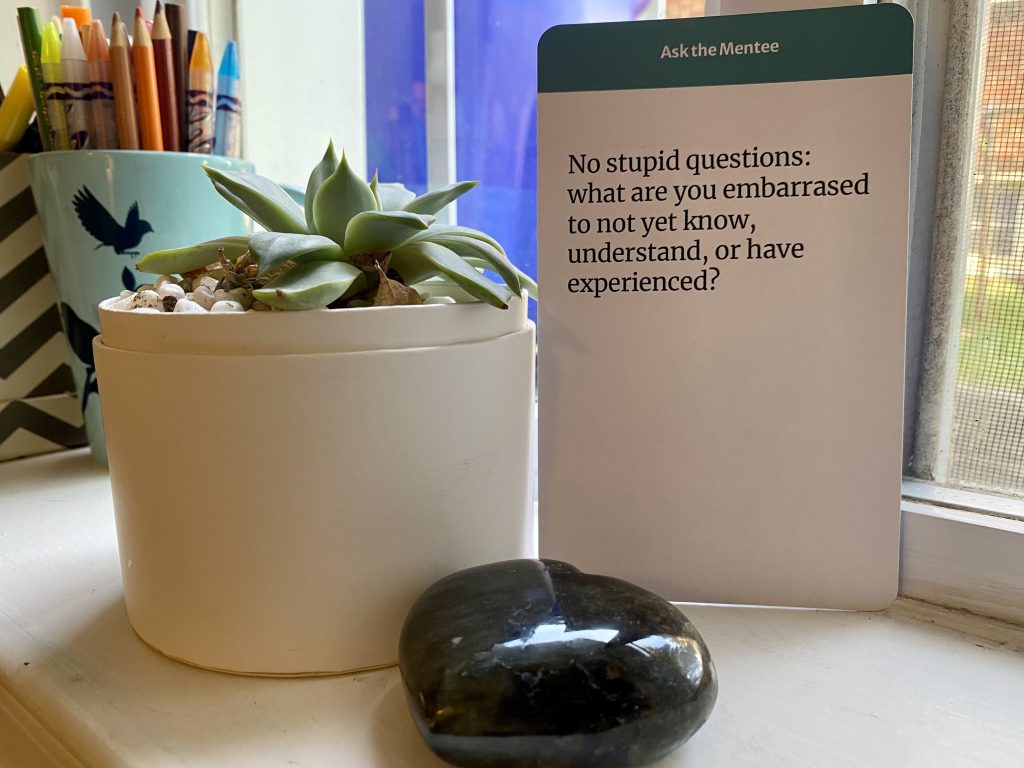
I got my first job in tech as a copywriter for a digital agency. This was a strange job twist because I had just finished a Master’s in French Lit. Alas, the job market in 2008 for French Literature grads was… underwhelming.
So I get this tech job and I start attending these meetings in conference rooms where people are drawing architectural diagrams of elaborate systems. I’m barely hanging on to what the hell is happening but I’ve been a foreigner in a strange land before. This isn’t French; it’s computer talk, so I make notes about vocab to look up later.
What is AIR? I write on a post-it. What is REST?
Thankfully, my officemates and I will one day laugh until we cry about what sounds like such poetic questions! But, at the time, I was not yet sure who I could ask about what seemed obvious to everyone else. What if someone thought I was (clearly) out of my league?
I guess I could have used a mentor.
Stupid Questions
What is a stupid question? Let’s unpack that first. A “stupid question” assumes that a line is being crossed, that something that should be inherently understood is not. An ecosystem exists; asking a “stupid question” suggests that you’re a stranger to that system. If you’re employed in that ecosystem, “stupid questions” can be threats to your legitimacy.
People say “there are no stupid questions!” as if the problem here is one of self-confidence. Sometimes that’s useful and we should lean into a learner mindset. But broad strokes cheerleading also tells people to ignore their instincts about the room they’re in. That’s not often helpful.
So I might change the word “stupid” here because it’s not what we really mean. What we really mean is “risky.” What we’re nervous about is asking “risky” questions.
Enter: Mentor
I’m writing about this in the context of Plucky’s Mentor Pack, a tool that mentors and mentees alike may find useful.
Ideally, a mentorship is a safe place to take risks. Mentors represent knowledge and experience that’s available to you for free, a resource that you can question again and again. Mentors are well-versed in ecosystems that you may not be familiar with and mentors can be our translators for these spaces.
In short, mentors are soft-landings for risky questions.
Ask the Mentee
So it should be easy to ask your mentor “stupid/risky” questions, right? Not always. When you’re building trust with someone, it probably takes a minute before you feel comfortable being vulnerable.
How risky can your question be? Is there an eyebrow-raising limit, even for patient mentors?
That’s where the card comes in. If a mentor hands you this card, they are literally inviting you to trust the space. It’s the mentor’s job to convey how okay it is to ask risky questions. This is why this card is in the “Ask the Mentee” category. It’s the mentor’s job to offer the bridge and this card is theirs to pull.
Why does a card work?
I’ve created three decks of cards to facilitate professional conversations and it’s still kind of amazing to see how it works. A card is a tool that helps you blame something else. “The card told me to ask this.” That’s all you have to say! You don’t have to be a dreamy, wild, Oprah-level questioner – even if those questions are exactly what would be useful to you. You can pull a card and you can blame a card and you can shortcut your way to the good stuff. This card is a piece of paper… but it’s also a way to get into risky questions.
So what?
It’s a boring, boring world staying where you are. You deserve asking as many stupid or risky questions that you want. I trust your instincts about safe spaces to explore the unknown; these cards may help light your way.